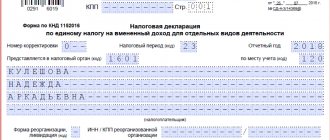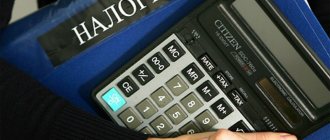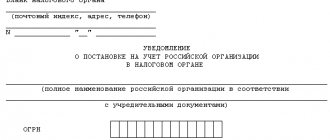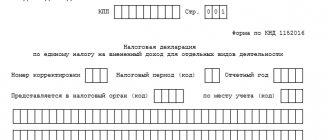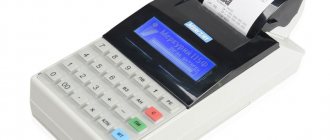When carrying out delivery and carry-out retail trade, persons wishing to switch to paying a single tax on imputed income are registered as a taxpayer of a single tax on imputed income with the tax office at the location of the organization or at the place of residence of the individual entrepreneur. To do this, they must submit an application for registration to the inspectorate within five days from the date of commencement of business activities. The inspectorate also issues a notification about registration as a single tax payer on imputed income within five days from the date of receipt of the taxpayer’s application.
Important
The tax period for the single tax on imputed income is a quarter.
Characteristics of trading operations
In peddling trade, the seller is in direct contact with the buyer. This type of trade includes trade from hands, trays, baskets and hand carts. This is stated in paragraph 18 of Article 346.27 of the Tax Code of the Russian Federation.
In distribution trade, goods are sold through specialized vehicles, as well as mobile equipment used only with transport. This type of trade includes trade using a car, a car shop, a car shop, a toner, a trailer, a mobile vending machine. This follows from paragraph 17 of Article 346.27 of the Tax Code of the Russian Federation.
Situation: are there any restrictions on the types of goods sold during delivery (distribution) trade for the purpose of applying UTII?
Yes, they do exist.
Despite the fact that Chapter 26.3 of the Tax Code of the Russian Federation does not establish such restrictions, when conducting retail trade outside of stationary retail facilities, the sale of:
- food products (except for ice cream, soft drinks, confectionery and bakery products in manufacturer's packaging);
- medicines;
- products made of precious metals and precious stones;
- weapons and ammunition for them;
- copies of audiovisual works and phonograms;
- programs for electronic computers and databases.
These restrictions are established by paragraph 4 of the Rules, approved by Decree of the Government of the Russian Federation of January 19, 1998 No. 55.
Thus, peddling and delivery trade in these goods is prohibited and, therefore, as an independent type of activity cannot be transferred to UTII. This special regime can only be applied if such goods are sold through a stationary retail chain.
What kind of trade cannot be considered delivery trade?
Now let’s look at the mistakes that will help you avoid problems with the law when determining the type of trade as delivery:
- trade cannot be considered delivery if you deliver the goods in accordance with a previously completed application or purchase and sale agreement;
- if your vehicle is not properly equipped, then trade from this vehicle also cannot be considered a delivery trade;
- if you trade from a tray, table, box, drawer, etc., i.e. Your trade equipment does not have the characteristics of a vehicle, then such trade cannot be considered delivery trade either.
Physical indicator
When calculating UTII from retail or delivery trade facilities, use a physical indicator - the number of employees including individual entrepreneurs (clause 3 of Article 346.29 of the Tax Code of the Russian Federation). The basic profitability for this type of activity is 4,500 rubles. per month from each employee (clause 3 of Article 346.29 of the Tax Code of the Russian Federation). How to calculate the number of personnel, see How to determine the number of employees working in activities subject to UTII.
When calculating UTII when selling goods through other objects of a non-stationary trading network, use the physical indicators “trading place”, “vending machine” or “area of trading place” (clause 3 of Article 346.29 of the Tax Code of the Russian Federation). In this case, the physical indicator “vending machine” must be used regardless of what category the vending machines belong to: stationary or mobile. Such clarifications are contained in letters of the Ministry of Finance of Russia dated May 13, 2011 No. 03-11-10/24 and dated March 28, 2011 No. 03-11-11/72.
When will the special regime be cancelled?
From July 1, 2021, all entrepreneurs engaged in delivery trade and falling under UTII will be required to start using online cash registers.
| Term | Explanation |
| Until July 01, 2021 | Voluntary use of the online cash register |
| From July 01, 2021 | Mandatory use of online cash register |
In order to start using the online cash register you need to:
- purchase cash register equipment;
- connect the cash register to the Internet;
- select a fiscal data operator and conclude an agreement (indicate the operator’s IP at the checkout);
- register an online cash register with the tax office and receive an online registration card;
- start using it!
For non-compliance with the law and the lack of an online cash register, significant fines are provided (for legal entities at least 30,000 rubles, for individuals at least 10,000 rubles).
The tax base
To calculate UTII, first determine the tax base for the reporting quarter. For carry-out and delivery trade, use the formula:
| Tax base for UTII for the quarter | = | Basic profitability per month (RUB 4,500) | × | Average number of employees for the first month of the quarter | + | Average number of employees for the second month of the quarter | + | Average number of employees for the third month of the quarter | × | K1 | × | K2 |
When retailing through other objects of a non-stationary retail network, calculate the tax base for UTII in the following order.
For retail spaces with an area of less than 5 square meters. m, determine the tax base for the quarter using the formula:
| Tax base for UTII for the quarter, calculated by the number of retail locations | = | Basic profitability per month (RUB 9,000) | × | Number of trading places used for purchase and sale transactions in the first month of the quarter | + | Number of trading places used for purchase and sale transactions in the second month of the quarter | + | Number of trading places used for purchase and sale transactions in the third month of the quarter | × | K1 | × | K2 |
For retail spaces with an area of more than 5 square meters. m, determine the tax base for the quarter using the formula:
| Tax base for UTII for the quarter, calculated by the area of retail outlets | = | Basic profitability per month (RUB 1,800) | × | The area of retail spaces used for purchase and sale transactions in the first month of the quarter | + | The area of retail spaces used for purchase and sale transactions in the second month of the quarter | + | The area of retail spaces used for purchase and sale transactions in the third month of the quarter | × | K1 | × | K2 |
When selling goods through vending machines, determine the tax base for the quarter using the formula:
| Tax base for UTII for the quarter, calculated by the number of vending machines | = | Basic profitability per month (RUB 4,500) | × | Number of vending machines used to sell goods in the first month of the quarter | + | Number of vending machines used to sell goods in the second month of the quarter | + | Number of vending machines used to sell goods in the third month of the quarter | × | K1 | × | K2 |
In this case, the values of the K2 coefficient should be applied depending on the category of vending machines used. For stationary vending machines, the coefficients established for stationary retail chain facilities are applied. Adjust the basic profitability of mobile vending machines taking into account the K2 coefficient established for non-stationary retail facilities. This is stated in the letter of the Ministry of Finance of Russia dated June 9, 2011 No. 03-11-09/35, addressed to the Federal Tax Service of Russia.
The values of physical indicators - the average number of employees and the area of retail outlets - are included in the calculation of UTII rounded to whole units (Clause 11 of Article 346.29 of the Tax Code of the Russian Federation). When rounding the size of physical indicators, discard values less than 0.5 units, and round 0.5 units or more to a whole unit (letter of the Ministry of Finance of Russia dated June 16, 2009 No. 03-11-11/111).
Using online cash registers
Online cash registers will soon occupy a significant place in the trade sector. The new cash register equipment will differ in that it will send online tax information about completed sales in real time. The online cash register does not require ECLZ or fiscal memory, but a fiscal storage device is required. A fiscal drive is a removable unit used to store, protect and transmit information to the Federal Tax Service. As the drive fills up, it must be replaced, as well as the online cash register. Each copy is registered electronically with the tax authority.
Change in physical indicator
If during the quarter the number of retail locations increased or decreased, take into account the changes from the beginning of the month in which they occurred (clause 9 of Article 346.29 of the Tax Code of the Russian Federation).
If an organization began or stopped using UTII during the quarter (for example, from February 20), then the tax base must be determined taking into account the actual duration of activities on UTII for the month in which the organization was registered (deregistered) as a single payer tax For more information about this, see How to calculate UTII.
Business ideas from scratch
CCP and in the CCP accounting book. According to Part 2 of Art. 14.5 of the Code of Administrative Offenses of the Russian Federation, a warning or imposition of a fine entails the following violations:
- non-use of cash register systems in cases established by federal laws;
- the use of a cash register that does not meet the established requirements or is used in violation of the procedure and conditions for its registration and use established by the legislation of the Russian Federation;
- refusal to issue, at the request of the buyer (client) in the case provided for by federal law, a document (sales receipt, receipt or other document confirming the receipt of funds for the relevant goods (work, service)).
In the mentioned cases, the administrative fine for citizens ranges from 1,500 to 2,000 rubles, for officials - from 3,000 to 4,000 rubles, for legal entities - from 30,000 to 40,000 rubles.
What can you trade?
OKVED code 52.63 allows you to trade any type of product. At the moment, some of the popular goods actively sold in this way are food, electrical equipment, fasteners, tools and even washing and detergents. But in addition to these goods, products such as baked goods, clothing and shoes can also be sold outside the store. The mobility of this type of business makes it possible to sell such types of goods as household goods, tools, elements used in lighting, and wiring.
By delivering certain types of goods to remote local populations, every businessman has the opportunity to make double profits. Unlike ordinary stores, this type of sales of goods is constantly subject to movement, which means that during the sale of their products, each time a businessman can simultaneously purchase agricultural products or various raw materials at a price that interests them.
Other products purchased in this way may be in demand in another locality, where mobile trade will subsequently move. Code 52.63, used for the sale of goods outside stores, also applies in the case of sales of goods through a machine.
>Taxation of traveling trade 2019
Taxation due to the traveling nature of work (Savinova M
The purpose of the bill “On the legal regulation of the activities of social networks and on amendments to certain legislative acts of the Russian Federation” is the legislative regulation of the activities of social networks. The bill proposes to prohibit the use of social networks by persons under 14 years of age. In addition, it is proposed to legislate the procedure for registering a social network user.
The use of cash registers (PRO) in 2021: what is changing since then?
- Who should apply PPO in 2021 Read more>>
- Sellers of equipment and electronics will have to use PPO and issue fiscal receipts>> More details>>
1. The requirements to use PPO for group 2 units and self-service terminals (PTKS) have come into force.
2. The transition period for the transfer of EKKA (cash registers) to digital data transmission has ended. The main criterion for using PPO is not the type of enterprise, but the fact of accepting payment in cash (or by payment card through a POS terminal, tokens, coupons, etc.)
Individual entrepreneur without a cash register in 2021 - in what cases is it possible
How will retail trade operate without cash register equipment? Under what conditions does an individual entrepreneur have the right to work and make cash payments with a buyer without a cash register? When can you work for the simplified tax system or for UTII without a cash register? All of the above issues are discussed in detail in this article.
Does an individual entrepreneur have the right to conduct cash payments with a buyer without cash register equipment in 2021?
Working without a cash register (KKM) in 2021 is possible for an entrepreneur if he:
- pays a single tax on imputed income (UTII) to the budget;
- instead of issuing receipts for goods to the buyer, he makes payments using strict reporting forms (SSR);
- trade is carried out in several types of business activities, for which the Tax Code of the Russian Federation and the laws of the Russian Federation allow doing business without a cash register in 2021;
- works in remote or hard-to-reach places.
For the extreme case of working without operating cash register equipment, there are some nuances.
Regional administration officials determine the degree of remoteness of the territory - the settlement in which the individual entrepreneur can trade, and establish a special list of such points. At the same time, individual entrepreneurs are prohibited from working without cash register equipment in cities and regional centers.
Individual entrepreneur trading without operating cash register equipment in 2021
The list of activities in which an individual entrepreneur has the right to trade without using cash register equipment is limited.
An individual entrepreneur may not use cash register equipment in the following cases:
- if the individual entrepreneur sells ice cream at a kiosk;
- has the right to trade in dairy products, beer and kvass drinks, sunflower oil, fish products and kerosene, which are located in tanks;
- sells various products in a school or student canteen;
- sells tea on the train;
- works at a kiosk if newspapers and magazine issues account for at least 50% of turnover. In this case, revenue from the sale of such products must be taken into account separately.
The list of additional commercial products that an individual entrepreneur has the right to trade is determined by regional authorities;
- sells lottery tickets and postage stamps at face value;
- is engaged in the sale of tickets for travel on trams and trolleybuses;
- sells religious books in a church or other religious place.
Individual entrepreneurs have the right to trade without cash register equipment at exhibitions or markets. At the same time, individual entrepreneurs are prohibited from selling products in containers and pavilions.
If an individual entrepreneur owns a car shop (tonar), a car shop, or a van (trailer), in this case it is necessary to install cash register equipment.
When trading apples from a truck, the individual entrepreneur may not use, but only after passing an inspection by auditors, this truck for the safety of the goods.
If an individual entrepreneur sells vegetable products and watermelons, then he has the right not to operate cash register equipment.
Without operating cash register equipment, an individual entrepreneur can sell from trays or baskets that are covered with plastic film or tarpaulin. At the same time, if an individual entrepreneur sells technically complex goods from a tray, then he must use a cash register.
If an individual entrepreneur sells goods that must be kept in special storage conditions, then in this case it is also necessary to use cash register equipment. For example, an individual entrepreneur has the right to sell potatoes without cash register. However, when selling frozen fish, an individual entrepreneur must use a cash register.
In addition, an individual entrepreneur may not use cash register equipment, working on a patent tax system. When working on a patent, an individual entrepreneur can, for example, sell services in a sales area with an area of 50 square meters. m. maximum.
At the same time, individual entrepreneurs who sell retail also have the right to work on a patent.
As a result, without using a cash register, an entrepreneur can do business in a stationary retail outlet, the sales area of which is 50 square meters. m. maximum or no trading floor at all, as well as in non-stationary trading premises.
If an individual entrepreneur makes payments in cash on UTII
If a businessman pays UTII, then he also has the right to work and make cash payments with the buyer without a cash register. In this case, an individual entrepreneur can sell products without operating a cash register in a pavilion whose sales area is 150 square meters. m. maximum.
https://www.youtube.com/watch?v=6qqK0CEzPG8
Also, a businessman may not use the cash register in the following situations:
- in stationary retail premises that do not have a sales area;
- in a commercial non-stationary premises that is not used when working on a patent.
Individual entrepreneurs who own a public catering establishment that does not have a sales area or whose area is 150 square meters may not use a cash register. m. maximum.
In addition, without operating cash register equipment, an individual entrepreneur can sell services to the public, but when making payments to a client, the entrepreneur must use strict reporting forms.
As a result, when trading without cash register equipment on UTII, the individual entrepreneur, at the buyer’s request, must issue him a check for the goods, a receipt or a document according to which he can accept cash from the client for a service or product.
Settlements with the buyer using the simplified tax system and cash register: is it necessary to use a cash register in 2021?
Federal Law No. 54 of May 22, 2003 reflects the rules for using cash register machines, on which individual entrepreneurs make payments in cash or using a bank card.
According to the law, an individual entrepreneur must operate cash register equipment if he settles with a client using a bank card or cash when selling goods, performing work or providing services.
However, there are several nuances:
- if the individual entrepreneur carries out all payments through a current account. However, he does not use cash. In this case, the individual entrepreneur has the right not to use the cash register.
However, in this case, the question arises: are all individual entrepreneurs ready for such payment conditions under which it is not possible to purchase goods for cash? In particular, trading with individuals using non-cash payments is difficult;
- When providing certain services to the population, an individual entrepreneur may not operate a cash register, but is required to issue strict reporting forms. How an individual entrepreneur can work with such a payment document is written in detail in various legal acts that regulate their accounting, procedure, form, features of their storage and destruction;
- if the individual entrepreneur works in a hard-to-reach place. The list of remote areas and cities was approved by the State Duma of the Russian Federation;.
- if the individual entrepreneur works in a pharmacy and paramedic station in the village;
- if the individual entrepreneur is engaged in some specific types of activities. For example, it accepts raw materials for recycling and glass containers from the population (except scrap metal);
The entire list of individual types of activities can be read in Art. 2 of the above law.
The result is that the type of organizational and legal form and the use of the simplified tax system can be ignored when deciding whether an individual entrepreneur should use a cash register. In this case, you should pay attention to the type and location of a certain type of activity;
- If an individual entrepreneur pays tax under UTII or under a patent, then the use of cash register equipment is not considered mandatory. However, the client has the right to demand, and the individual entrepreneur is obliged to give a receipt for the goods or a similar document.
If an individual entrepreneur falls into one of the above exceptions, then there is no need to buy a cash register and register it officially. For other individual entrepreneurs working on the simplified tax system, this is a mandatory condition.

